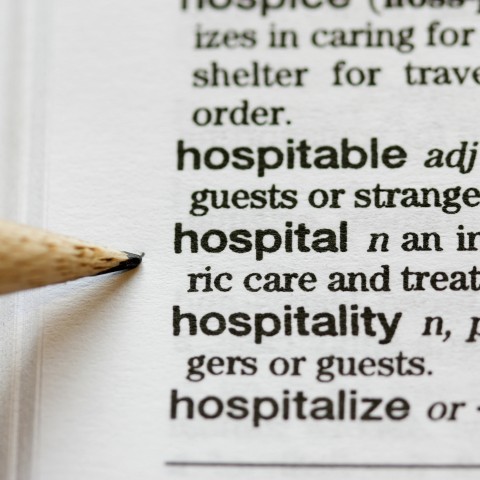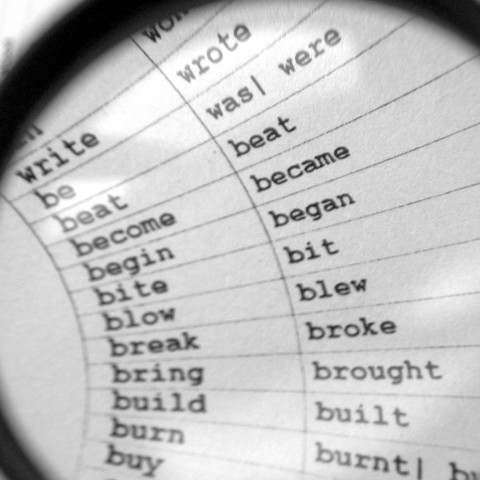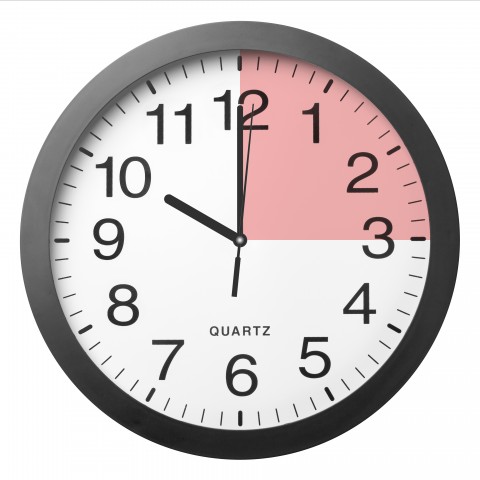Intermediate German Words to Level Up Your Vocab

Words in German. It scares off many learners, especially when they listen to people speaking some of its more complicated dialects.
Even as a fluent German speaker, I find it unbelievably hard to understand the Swiss German variety. To this day, I still have to ask if the person can switch to Hochdeutsch (formal German).
But some people, including yourself, may end up managing to get the courage to push past the fear and frustration. Once you do, things will get much easier, especially once you start picking up the essential beginner and intermediate German words.
Words will start to make more sense, and you’ll slowly but surely start to figure out that a lot of German vocabulary consists of compound words with unique meanings. You’ll start getting more and more compliments on your German, and you’ll start to have a better feel for the German sentence structure.
At this stage, you’re a pre-intermediate learner: someone who is past the beginner level and on a steady road to fluency. On your way there, picking up a lot of vocabulary will be key to having meaningful conversations with native speakers on a greater variety of topics. After all, you don’t want to be pausing mid-conversation to ask what a word means!
That’s where this article comes in handy.
We’ve taken the time to put together a list of several intermediate German words by category, accompanied by their English translations. In addition, we’ve broken down some of the best ways to retain and practice new vocabulary so that you can efficiently memorize the words below.
Without further ado, let’s get right into it…
Large Numbers – große Zahlen

One of the first things you should learn as you approach the intermediate level in German is how to form large numbers. This will help you deal with a variety of everyday situations, such as making expensive purchases or telling someone your age.
| English Translation | German Word | Number |
| “ten” | Zehn | 10 |
| “eleven” | elf | 11 |
| “twelve” | zwölf | 12 |
| “thirteen” | dreizehn | 13 |
| “fourteen” | vierzehn | 14 |
| “fifteen” | fünfzehn | 15 |
| “sixteen” | sechzehn | 16 |
| “seventeen” | siebzehn | 17 |
| “eighteen” | achtzehn | 18 |
| “nineteen” | neunzehn | 19 |
| “twenty” | zwanzig | 20 |
| “thirty” | dreißig | 30 |
| “forty” | vierzig | 40 |
| “fifty” | fünfzig | 50 |
| “sixty” | sechzig | 60 |
| “seventy” | siebzig | 70 |
| “eighty” | achtzig | 80 |
| “ninety” | neunzig | 90 |
| “a hundred” | einhundert | 100 |
| “a thousand” | eintausend | 1,000 |
| “ten thousand” | zehntausend | 10,000 |
| “a hundred thousand” | Hunderttausend | 100,000 |
| “a million” | eine Million | 1,000,000 |
Nouns – Nomen

Nouns make up the bulk of our vocabulary, so it’s good for intermediate German learners to pick up as many as they can in different categories.
Time – Zeit
| English Translation | German Word |
| “Century” | Jahrhundert |
| “Morning” | Morgen |
| “Evening” | Abend |
| “Quarter” | Quartal |
| “Semester” | Semester |
Places – Plätze
| English Translation | German Word |
| “Region” | Region |
| “Department” | Abteilung |
| “Village” | Dorf |
| “Park” | Park |
| “Bank” | Bank |
| “Pharmacy” | Apotheke |
| “Hospital” | Krankenhaus |
| “Bakery” | Bäckerei |
| “Cliff” | Klippe |
| “Beach” | Strand |
| “Island” | Insel |
| “Hill” | Hügel |
Technology – Technologie
| English Translation | German Word |
| “Screen” | Bildschirm |
| “Keyboard” | Tastatur |
| “Mouse” | Maus |
| “Tablet” | Tablet |
| “TV” | Fernseher |
| “Console” | Konsole |
| “Charger” | Ladegerät |
| “Website” | Webseite |
| “Account” | Konto |
| “Password” | Passwort |
| “File” | Datei |
| “Folder” | Folder |
| “Software” | Software |
Home – Zuhause
| English Translation | German Word |
| “Room” | Zimmer |
| “Floor” | Fußboden |
| “Living room” | Wohnzimmer |
| “Bathroom” | Bad |
| “Fridge” | Kühlschrank |
| “Wardrobe” | Kleiderschrank |
City & Transportation – Stadt & Verkehr
| English Translation | German Word |
| “Suburbs” | Vorort |
| “Neighborhood” | Nachbarschaft |
| “Highway” | Autobahn |
| “Alley” | Gasse |
| “Roundabout” | Kreisel |
| “Crossroad” | Kreuzung |
People – Menschen
| English Translation | German Word |
| “Uncle” | Onkel |
| “Aunt” | Tante |
| “Grandson” | Enkel |
| “Granddaughter” | Enkelin |
| “Child” | Kind |
| “Grandfather” | Großvater |
| “Grandmother” | Oma |
Body Parts – Körperteile
| English Translation | German Word |
| “Finger” | Finger |
| “Back” | Rücken |
| “Belly” | Bauch |
| “Breast” | Brust |
| “Shoulder” | Schulter |
| “Leg” | Bein |
| “Thigh” | Schenkel |
| “Butt” | Hintern |
| “Foot” | Fuß |
| “Cheek” | Wange |
| “Chin” | Kinn |
| “Forehead” | Stirn |
Food – Essen
| English Translation | German Word |
| “Knife” | Messer |
| “Fork” | Gabel |
| “Spoon” | Löffel |
| “Wine” | Wein |
| “Dish” | Gericht |
| “Appetizer” | Vorspeise |
| “Dessert” | Nachtisch |
| “Drink” | Getränk |
| “Coffee” | Kaffee |
Work & Studies – Arbeit & Studium
| English Translation | German Word |
| “Nurse” | Krankenschwester |
| “Judge” | Richter |
| “Lawyer” | Anwalt |
| “Waiter” | Bedienung |
| “Scientist” | Wissenschaftler |
Clothes – Kleider
| English Translation | German Word |
| “Pants” | Hose |
| “Sweater” | Pullover |
| “T-shirt” | T-Shirt |
| “Shirt” | Hemd |
| “Coat” | Mantel |
| “Socks” | Socken |
| “Shoes” | Schuhe |
| “Dress” | Kleid |
| “Hat” | Hut |
3. Verbs – Verben

At this point, you already know the most important action words and auxiliaries. To help you level up and expand your vocabulary, here are the essential intermediate German verbs that will allow you to get your point across more accurately.
| German Word | English Translation |
| dienen | “to serve” |
| verlassen | “to leave” |
| erlauben | “to allow” |
| senden | “to send” |
| bekommen | “to get” / “to receive” |
| leben | “to live” |
| anrufen | “to call” |
| erinnern | “to remind” |
| vorstellen | “to introduce” |
| akzeptieren | “to accept” |
| ablehnen | “to refuse” |
| handeln | “to act” |
| spielen | “to play” |
| erkennen | “to recognize” |
| wählen | “to choose” |
| berühren | “to touch” |
| erklären | “to explain” |
| aufstehen | “to get up” |
| [responsivevoice voice="Deutsch Female" rate="0.8" buttontext="►"]öffnen | “to open” |
| schließen | “to close” |
| gewinnen | “to win” |
| verlieren | “to lose” |
| existieren | “to exist” |
| erfolgreich sein | “to succeed” |
| wechseln | “to change” |
| arbeiten | “to work” |
| studieren | “to study” |
| schlafen | “to sleep” |
| gehen | “to walk” |
| versuchen | “to try” |
| stoppen | “to stop” |
| weitermachen | “to continue” |
| kochen | “to cook” |
| gehören | “to belong” |
| riskieren | “to risk” |
| lernen | “to learn” |
| [responsivevoice voice="Deutsch Female" rate="0.8" buttontext="►"]treffen | “to meet” |
| erschaffen | “to create” |
| werden | “to become” |
| betreten | “to enter” |
| beenden | “to exit” |
| anbieten | “to offer” |
| bringen | “to bring” |
| benutzen | “to use” |
| erreichen | “to reach” |
| vorbereiten | “to prepare” |
| hinzufügen | “to add” |
| bezahlen | “to pay” |
| berücksichtigen | “to consider” |
| kaufen | “to buy” |
| drücken | “to push” |
| einkaufen | “to shop” |
| reisen | “to travel” |
Adjectives – Adjektive

If nouns and verbs are the bread and butter of language, adjectives are the honey. These words add a bit of flavor and personality to your speech, allowing you to give vivid descriptions of the world around you. Below are a few German adjectives to get you started.
| German Word | English Translation |
| genial | “awesome” |
| schrecklich | “horrible” |
| seltsam | “weird” |
| kompliziert | “complicated” |
| dick | “thick” |
| dünn | “thin” |
| nah | “near” |
| weit | “far” |
| eng | “narrow” |
| breit | “wide” |
| sanft | “soft” |
| hart | “hard” |
| voll | “full” |
| leer | “empty” |
| leicht | “light” |
| schwer | “heavy” |
| einzigartig | “unique” |
| besonders | “special” |
| neu | “new” |
| alt | “old” |
| arm | “poor” |
| reich | “rich” |
| sauber | “clean” |
| dreckig | “dirty” |
| schwach | “weak” |
| stark | “strong” |
| schlank | “slim” |
| fett | “fat” |
| süß | “cute” |
| bedeutend | “important” |
| komisch | “funny” |
| nett | “nice” |
| glücklich | “happy” |
| traurig | “sad” |
| ruhig | “calm” |
| aufgeregt | “excited” |
| gefährlich | “dangerous” |
| langweilig | “boring” |
| würzig | “spicy” |
| zweiter | “second” |
| nächster | “next” |
| bisheriger | “previous” |
| vorletzter | “second-to-last” |
| orange | “orange” |
| rosa | “pink” |
| grau | “gray” |
| lila | “purple” |
| magenta | “magenta” |
| türkis | “turquoise” |
5. Adverbs – Adverbien

Adverbs help us give more apt descriptions of how (or to what extent) something was done. Here are just a few of the more common German adverbs for you:
When – Wann
| German Word | English Translation |
| [responsivevoice voice="Deutsch Female" rate="0.8" buttontext="►"]schon | “already” |
| vor langer Zeit | “a long time ago” |
| jetzt | “now” |
| nochmal | “again” |
| zu guter Letzt | “at last” |
| dann | “then” |
| danach | “thereafter” |
How Often – Wie Oft
| German Word | English Translation |
| manchmal | “sometimes” |
| selten | “rarely” |
| in der Regel | “usually” |
| allgemein | “generally” |
| die ganze Zeit | “all the time” |
Where – Wo
| English Translation | German Word |
| “nowhere” | nirgends |
| “somewhere” | irgendwo |
| “elsewhere” | anderswo |
| “up” | oben |
| “down” | unten |
| “over” | über |
| “under” | unter |
| “far” | weit |
How – Wie
| English Translation | German Word |
| “quietly” | leise |
| “slowly” | langsam |
| “quickly” | schnell |
| “calmly” | ruhig |
| “easily” | leicht |
| “luckily” | glücklicherweise |
| “simply” | einfach |
How Much – Wie Viel
| German Word | English Translation |
| genug | “enough” |
| insbesondere | “especially” |
| fast | “almost” |
| wie viel | “how much” |
| so viele | “so many” |
| so wenig | “so few” |
| über | “about” |
6. Prepositions – Präpositionen
The next set of words we’ll add to your intermediate German vocabulary are prepositions.
Time – Zeit

| English Translation | German Word |
| “before” | vor |
| “after” | nach dem |
Space – Raum
| English Translation | German Word |
| “next to” | neben an |
| “to the right” | nach rechts |
| “to the left” | nach links |
| “at” | beim |
| “in front of” | vor dem |
| “behind” | hinter |
| “under” | unter |
| “over” | über |
Other – Andere
| German Word | English Translation |
| zwischen | “between” |
| dank an | “thanks to” |
| trotz | “despite” |
| ohne | “without” |
| mit | “with” |
7. Conjunctions – Konjunktionen
| German Word | English Translation |
| weder… noch… | “neither… nor…” |
| so / also | “so” |
| andernfalls | “otherwise” |
| da | “since” (as) |
| wenn | “when” |
| deshalb | “therefore” |
8. Particles – Partikel
To conclude our list, let’s look at a few German particles that are used for affirmation, negation, and intensification.
Affirmation
| German Word | English Translation |
| aber | “but” |
| ja | “yes” |
| wohl | “well” |
Negation
| German Word | English Translation |
| auf keinen fall | “no way” |
| niemals | “never” |
Intensification
| German Word | English Translation |
| schon | – |
| mal | – |
| nun | “well” |
| denn | – |
9. Conclusion
Herzlichen Glückwünsch! (“Congratulations!”)
You should now have a pretty good idea about intermediate German particles, conjunctions, prepositions, adverbs, and more.
Without these words as your weapons, you’d struggle to cross that intermediate learner mark!





























